- Home
- Clive Barker
Abarat: Absolute Midnight Page 11
Abarat: Absolute Midnight Read online
Page 11
As he studied the corridor of shadow before him and ever-deeper shadow ahead of him he became aware that he, the studier, was himself being studied. He let his gaze follow his instinct up into the
lower branches of a tree close by. There sat three members of the pale-feathered flock that had made such noisy passage between the trees only a couple of minutes before. They were silent now, hushed perhaps by the melancholy scene below. He watched them watching him, unnerved by their scrutiny.
And then, from behind, came the sound of Covenantis’s voice, singing with unnerving accuracy, in a falsetto, a song his mother had obviously written to sing herself. It had the lilting rhythm of a lullaby. These were the primal sounds of an Abarat that was holding the Hours in trust for humankind to one day possess. Sounds that were about light and darkness, sky and sea, rock and fire.
“Kai tu penthni,
Kai tu ky,
Hastegethchem
Smanné fy.”
And death. That was the subject waiting behind all the other immensities. Death the merciless, death the irrevocable, the enemy of all things tender and easily broken: cracked like an egg dropped from a high place; burned black when lightning turned the forest to fire; killed by the cold, huddled in the cleft of a rock.
And still the ancient words came, flowing so fearlessly the boy might have been reciting his own name.
“U Tozzemanos,
Wo th’chem
Wo Kai numma
Jeth yo yem.”
What was he doing? Malingo’s curiosity grew more insistent the longer the recitations went on. What kind of comfort could he possibly be offering his brother that required the uttering of words so ancient and alien?
Malingo was in the process of instructing himself not to turn, not to look, when his body acted upon a demand far deeper than his instruction.
He turned and looked. Again his body overtook his mind, this time to simply expel a word—
“No!”
—not once but over and over and over—
“No! No! No! No!”
k
Candy didn’t waste time wondering why Malingo was shouting. She simply seized the moment, and with it, the snake. Boa’s foot was still on the animal’s head, but neither her full attention nor her weight were with it, so when Candy pulled on her invented beast it slid out from under the Princess’s foot without a struggle.
The serpent gave out a most unserpentine din of mutinous rage, writhing fiercely. She tried to grab its twisting coils with her free hand, but she was concentrating so hard on doing so that all thought of Boa and her lethal designs went out of her head. She half turned carelessly, and realized too late that her eyes had grazed the shape of Boa, moving toward her. Worse, they would not now let go. She tried to detach her sight from the form of the Princess—and worse, from the sight of the designs, moving up and over her face, forming their nauseating symbols in the air around her head. Signs to make a body recoil against itself: to make it turn itself inside out in a frenzy of disorder, to work against nature, against purpose, against life, and destroy itself.
So much destructive power was encoded in the patterns playing on Boa’s face. Even though Candy knew the harm they would make her do to herself, their enchantment had more power than her will. She couldn’t force it from her, even when she felt her stomach turning over—
“Don’t! Look!” Laguna Munn shrieked.
She didn’t have a gentle voice, a voice of calm or contemplation. No, her voice was rude and raw, which was just what the moment needed.
Much to Candy’s relief and astonishment, her eyes had obeyed the instruction. As soon as she looked away, her will was her own again.
“Good!” Mrs. Munn said. “Now quickly, girl! Give that damnable beast to me.”
Candy began to offer it, but Mrs. Munn was impatient.
“Give the beast to me!” she said. She appeared from within the trees and reached out to take hold of the animal. “Next time, call up an ax!” she said as she dragged the creature out of Candy’s arms. “Snakes are all teeth and talk!”
“I’ll make you regret—” the snake began to say, but Mrs. Munn was in no mood for its threats.
She wrenched its tail off Candy’s arm, and all but bundled the creature into a ball of black-and-yellow coils.
Then she told it: “Go bite a Boa!” and threw it at the Princess.
Grabbing hold of Candy’s sleeve, Mrs. Munn dragged her off between the trees, leaving Princess Boa and the conjured serpent to take out their lethal rage upon each other.
Chapter 19
The Price of Freedom
“A WALL OF BLUE FLAME Thorns is going around those two,” Mrs. Munn said as she hurried Candy away from the spot where they’d left Boa and the snake to match their venomous skills. The incantatrix was no longer the figure of calm power and confident abundance she’d been when Candy had first met her. The colors in her dress had been somehow removed, and one of her feather antennae had been torn out. Everywhere there was evidence of how hard the last few minutes had been. She was scratched, bruised, and sweating: an exhausted fighter still standing, but only by sheer force of will.
“When will the wall go up?” Candy asked her.
“It’s already up. No, girl, don’t look back! Lordy Lou, when are you going to learn some caution? You’re not playing games. The Boa girl may have been a civilized tenant when she was sharing your head, but that simply testifies to the power of your influence. You must have kept her villainy subdued, without knowing you were doing it. But she’s loose now.”
“What about the wall of Flame Thorns?”
“Oh, that’s not going to detain her for very long. Nor is that ridiculous snake of yours.”
“You were right. I should have made an ax—”
“It would have been no more use than . . . the . . . snake.” As Mrs. Munn’s words slowed down so did her pace until she was standing still, Candy beside her, staring off into the trees. Candy looked for some sign of Malingo, or of Jollo and Covenantis, but the shadows between the trees seemed particularly dense directly ahead of them: almost clotted.
“What’s wrong?” Candy said.
“One of the boys,” Mrs. Munn said. “Something’s happened to one of my boys.”
She started to pick up speed again, moving swiftly, parting the darkness ahead of her like a curtain with a few muttered words. Candy kept up, but there was no longer room for them to walk side by side: the trees and the shadows were too tightly packed. She could only follow after Mrs. Munn as she wove between the trees.
Finally, a figure appeared from the darkness ahead of them. It was Malingo. Even before Mrs. Munn had reached him, he began to apologize:
“I didn’t know how to stop him. He had these words . . . from one of your books—”
“Jollo was doing magic?”
“No, Mrs. Munn. It was Covenantis. He started reciting some sort of conjuration—” He put his hand up to his face, which was wet with tears. “I tried to stop him, but he took no notice. He wasn’t reading from a book so I couldn’t take the words away from him. He had them all in his head.”
“Oh, I’m sure,” Mrs. Munn said. “He’s a very intelligent child. That’s a piece of the good I put in him before he was born.” She studied the clogged darkness that lay ahead of them. “Where is he now?” she said.
“He’s still with Jollo. But I don’t know exactly where.” He frowned, and shook his head, confounded by his own stupidity. “They should be right there behind me, because almost as soon as I went off looking for you both—I couldn’t have taken more than two or three paces—I thought: this is wrong. I should do as Candy said and stay with them. So I turned back, and there was shadow, thick shadow, where there hadn’t been any before.”
“You know why.”
“Me?” Malingo said.
“You don’t have to say it,” Mrs. Munn replied, her voice softer than it had been until now. “Maybe you didn’t even realize you were running from
it.”
“I wasn’t running from anything. I told you. I didn’t even know what was happening.”
Laguna Munn moved past Malingo, advancing toward a place from which all light had been driven. “But you heard it in the words he was saying.”
“It wasn’t a language I understood.”
“Even so, you heard it,” she said.
It wasn’t a question. She was merely stating what they both knew. He didn’t attempt to avoid admitting the truth any longer.
“Yes, I heard,” he said.
“Heard what?” Candy asked.
“Death,” he said.
And as if responding to that summoning word, the shadows ahead of the incantatrix tore themselves apart as though they were made of wet newspaper. Malingo didn’t want to see, at least not yet. He slipped between two trees, allowing Candy to follow Mrs. Munn, who had now passed beyond the shredded shadows, and was looking at what lay between the trees directly ahead of her.
The boy was dead, no doubt of that. His body had withered considerably more since Candy had last seen him, his flesh so drained of its vital juices that the bright, dark creature he had once been had gone entirely. What was left looked like a dwarf lying in a baggy shirt made of skin.
He looks so small, Candy thought: small and colorless. Jollo’s skin had been as black as the night sky, with fireworks streaking through it. Where had all that darkness and color gone? Death had scoured Jollo’s remains so completely clean that it looked more like his brother’s body.
Either that or—
Or what?
“I don’t think that’s Jollo, Mrs. Munn,” Candy said very quietly, as though the news might disturb the dead.
“I know,” Mrs. Munn replied.
The fact that the corpse was so very small now made sense. The remains before them weren’t those of the beloved and well-fed Jollo B’gog. It was Covenantis’s body, Candy realized, which lay in the grass.
“What happened to him?” Candy said, her voice hushed with horror. “Did the magic he was wielding backfire?”
“No. The wielding worked exactly as he wished it to,” Jollo said.
As he spoke he emerged from between the trees on the far side of his brother’s body. All trace of the damage Boa had done to him in consuming his life force had been healed, and Jollo was once again the gleaming, glorious creature he’d been when he’d first introduced himself to Candy and Malingo: his mother’s pride and joy. All he lacked was his dazzling grin.
“He used the Old Magic, Mama. I had nothing to do with it, I swear. He just gave me his life. I didn’t even know you could do something like that.”
“You can’t. Not easily. You have to find the right conjuration, and learn it perfectly, speak it perfectly. And then, of course, you have to be ready to give up your life.”
“That’s what he did, Mama. I didn’t even know he was doing it. I swear I didn’t.”
“So your brother gave up his life out of the goodness of his heart?”
“Not of his heart, Mama. Yours. That’s what you made him out of, isn’t it?”
Mrs. Munn stared hard at Jollo, clearly assessing his honesty. “And you, boy, I made from all the wickedness in me. My capacity for cruelty. And for vengefulness. And for lies.”
“Are you saying I’m a liar, Mama?” Jollo said. He literally bristled at the idea. His glossy black coat, which had lain so perfectly flat that Candy hadn’t even realized Jollo had fur until this moment, now stood up in three parallel ridges that went from the front of his head to the back, and described a spiral on his belly, centered where a normal child had a navel.
“Don’t you raise your hackles at me, boy!”
“Then don’t call me a liar when I’m not.”
“Your brother is dead, Jollo. I need to know why!”
“Then ask the geshrat!” Jollo said. “He saw it all!”
Mrs. Munn looked to Candy. “Where did your friend go?”
“He’s not gone far. I think he’s just keeping a respectful distance.”
She looked back over her shoulder, sensing Malingo there rather than seeing him, then quietly telling him:
“She’s not angry. She just wants to know—”
“Yes, I heard,” Malingo said, coming out of the shadows between the trees. “And it all happened pretty much as Jollo said it did. The little kid used a conjuring in Old Abaratian. I could feel the power in the words. And I saw the life, like a stream of light and water, running out of him and into Jollo, who was just lying there, near enough dead. He didn’t say anything to make it happen. It was Covenantis’s doing. The whole thing.”
“Did you try to stop it at least?” Mrs. Munn said.
“Of course. I started yelling at him. But that didn’t work. And he wouldn’t let me get close to him to stop him by separating them. When I tried, some force just threw me back, and I hit the ground. I kept trying but eventually there was no point. Covenantis just withered away. All he said was that he knew you’d understand. His exact words were: ‘Tell Mama: She’ll understand.’”
“Stupid,” Mrs. Munn murmured.
“I did what I could,” Malingo replied.
“Not you, geshrat. My boy. My firstborn.”
“It’s too late to say that now!” Jollo replied. “I mean, look at him! He’s gone forever, Mama, and he’s never coming back.”
Mrs. Munn nodded.
“If he wanted to punish me,” she said, “then he succeeded.”
“Punish you?” Candy said. “Why?”
“Because I was not the loving mother I should have been. Because I loved the darkness in me more than the light.” She approached the tiny body in its shroud of oversized skin, and went down onto her knees beside it. “Forgive me, child,” she said softly. There were tears in her voice.
“I think we should go,” Candy said.
“Yes, I think maybe you should,” Laguna Munn said, not turning to look at Candy or Malingo, just staring down at the dead boy.
“I’m . . . sorry,” Candy said.
“It wasn’t your fault. The error was mine. Be well, Candy Quackenbush. The struggles ahead of you will test you to the limits of your endurance. Beyond them, perhaps. But if you are in need of further healing . . .”
“Yes?”
“. . . don’t come here in search of it.” Tears thickened every one of her words. “Jollo,” she said. “Take them down to the harbor and find them a boat.”
“Thank you,” Candy said.
Mrs. Munn did not acknowledge her thanks, or say so much as a single word in reply. She had laid her hands on the body of her dead child, and her tears fell on it.
That was Candy’s last image of the great incantatrix, Laguna Munn: kneeling beside the body of the boy made from all the good in her, with her tears falling and falling.
Once out of his mother’s presence, Jollo became very talkative, keeping up a monologue of chatter about one subject only: himself. Was this a necessary part of evil? Candy wondered as she listened to him: this utter self-absorption, as though nothing else in the world mattered but Jollo and his boredom, Jollo and how he’d suffered during Boa’s attack, Jollo and what he was going to do when he left the rock and went out into the Abarat.
“There’s a time coming, Mama says, when someone with my genius for wicked things will be really useful. I mean, I’m going to be a King, at least. Probably something more than a King. What’s more than a King? Oh, like someone who kills a King. That’s what I’m going to be. Because if you kill something you’re more important than whatever you killed. Mama didn’t tell me that. I just thought it up myself. Because I have these dreams, see, where it’s the future, and everything boring and good is being lined up to be killed. They’ll have their heads chopped off. I might do the chopping, but no, that’d be boring wouldn’t it? I hate being bored. That’s why I’m going to leave very soon. . . .”
And so he went on, an endless speech about Jollo, Jollo and more Jollo. When they eventually emerged
from the trees they saw before them a shallow bay with a short, wooden jetty that jutted from the steep beach. Candy and Malingo exchanged looks of relief. They were going to be out of the boy’s company very soon.
Jollo, however, had one subject left to pontificate upon.
“When I leave here,” he told Candy, “I’m going to be taking all of Mama’s magic books with me, because she’s got books that there’s only one of, and I could get thousands of paterzem for a magic book that there was only one of, right? So do you want me to bring them to you first? I know the geshrat’s too stupid to read a big book, but you’re famous aren’t you? Mama told me before you arrived—” They were on the jetty now, the boards creaking beneath them.
“She knew I was coming?” Candy said.
“Excuse me,” Jollo snarled. “I was still talking. How dare you interrupt me? You know what? I’m not going to bring Mama’s books. Not when you’re so rude. I can’t believe that! Ignorant peasant! Don’t try groveling because that won’t get you anywhere. Grovelers are pathetic. Like my brother. He used to grovel when I kicked him really hard. I’m going to miss him. I won’t have anyone to kick. I just had a brilliant idea! I’ll forgive you for being rude, and I’ll bring you the books like I said I would. All you have to do is leave the geshrat here. I won’t hurt him badly. I’ll just do the same stuff I did with my brother. You know, kicking and spitting and stuff. That’s a good deal, right? I mean, when I’m King you’re going to be so glad I forgave you because otherwise your life won’t be worth living.” He grinned. “Like my brother. I got his life because I’d made his so miserable.” The grin broke into squalid laughter. “That’s the stupidest thing anybody ever did, isn’t it? When I’m King I’m going to make him a saint. He’s going to be Saint Covenantis, the Patron Saint of Stupid People! Ha! I love that! He’ll have his own Holy Day. Today, the day he died. Nobody will work. They’ll just say stupid prayers for a stupid saint of stupid people. Wait! What’s your geshrat doing.”

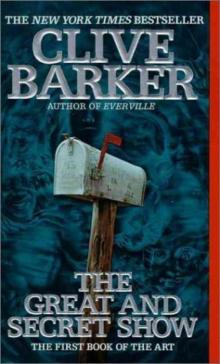 The Great and Secret Show
The Great and Secret Show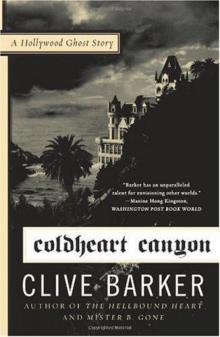 Coldheart Canyon: A Hollywood Ghost Story
Coldheart Canyon: A Hollywood Ghost Story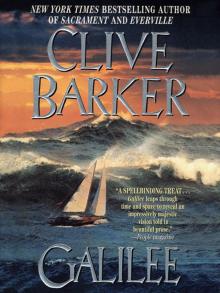 Galilee
Galilee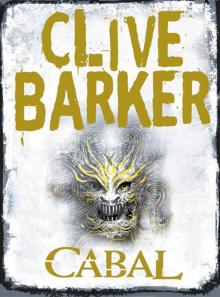 Cabal
Cabal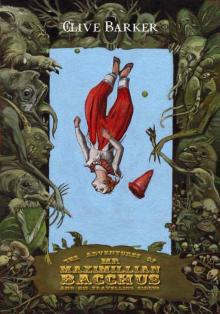 The Adventures of Mr. Maximillian Bacchus and His Travelling Circus
The Adventures of Mr. Maximillian Bacchus and His Travelling Circus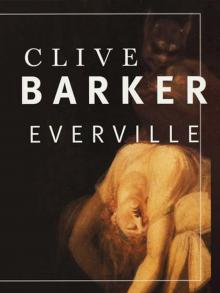 Everville
Everville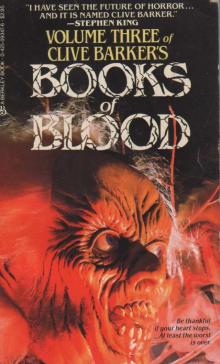 Books of Blood: Volume Three
Books of Blood: Volume Three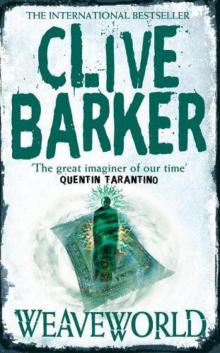 Weaveworld
Weaveworld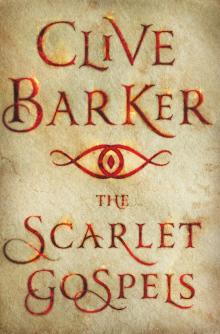 The Scarlet Gospels
The Scarlet Gospels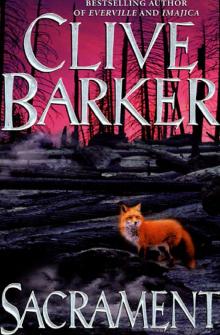 Sacrament
Sacrament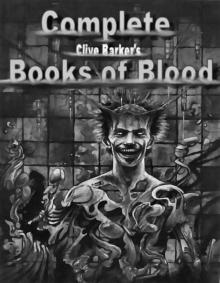 Books of Blood: Volumes 1-6
Books of Blood: Volumes 1-6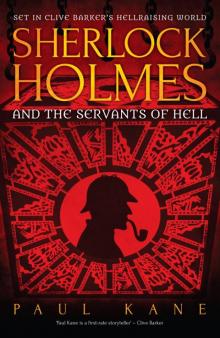 Sherlock Holmes and the Servants of Hell
Sherlock Holmes and the Servants of Hell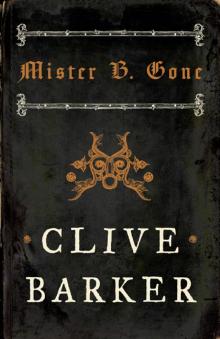 Mister B. Gone
Mister B. Gone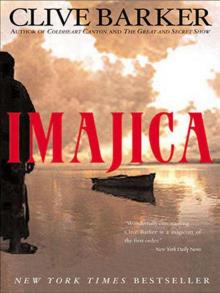 Imajica
Imajica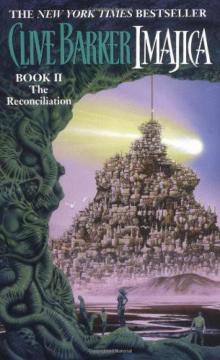 The Reconciliation
The Reconciliation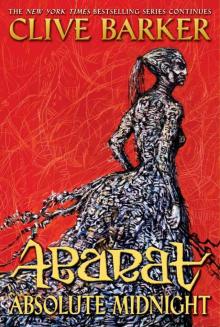 Abarat
Abarat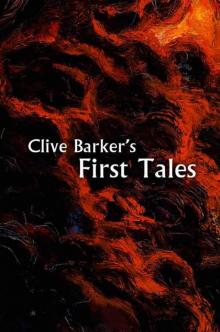 Clive Barker's First Tales
Clive Barker's First Tales The Hellbound Heart
The Hellbound Heart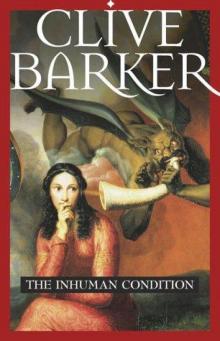 The Inhuman Condition
The Inhuman Condition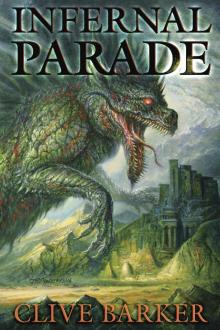 Infernal Parade
Infernal Parade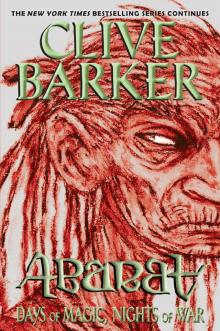 Days of Magic, Nights of War
Days of Magic, Nights of War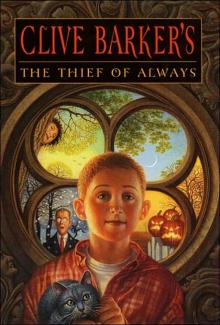 The Thief of Always
The Thief of Always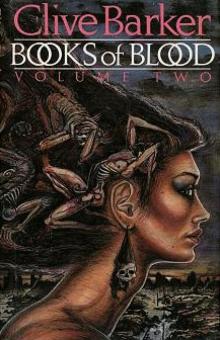 Books of Blood Vol 2
Books of Blood Vol 2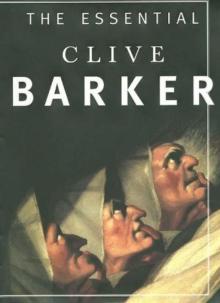 The Essential Clive Barker
The Essential Clive Barker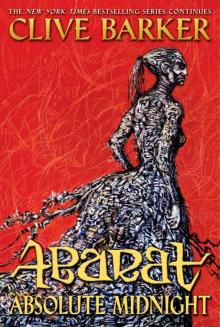 Abarat: Absolute Midnight a-3
Abarat: Absolute Midnight a-3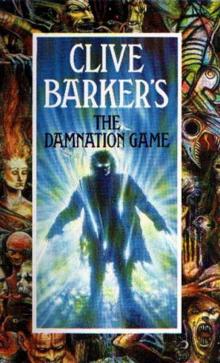 The Damnation Game
The Damnation Game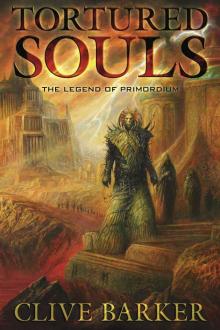 Tortured Souls: The Legend of Primordium
Tortured Souls: The Legend of Primordium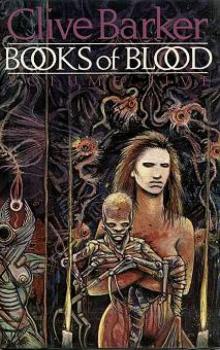 Books of Blood Vol 5
Books of Blood Vol 5 Imajica 02 - The Reconciliator
Imajica 02 - The Reconciliator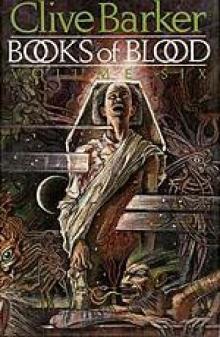 Books Of Blood Vol 6
Books Of Blood Vol 6 Imajica 01 - The Fifth Dominion
Imajica 01 - The Fifth Dominion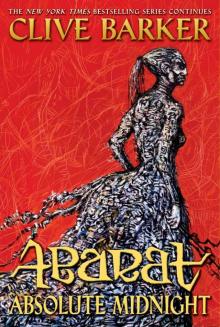 Abarat: Absolute Midnight
Abarat: Absolute Midnight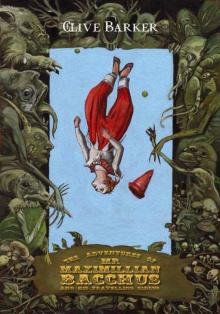 The Adventures of Mr. Maximillian Bacchus & His Traveling Circus
The Adventures of Mr. Maximillian Bacchus & His Traveling Circus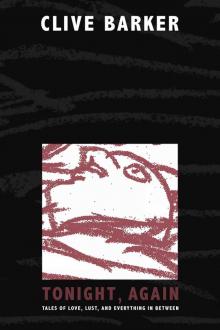 Tonight, Again
Tonight, Again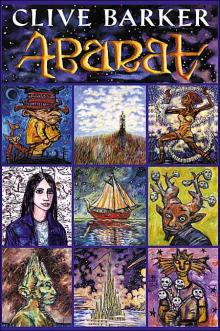 Abarat: The First Book of Hours a-1
Abarat: The First Book of Hours a-1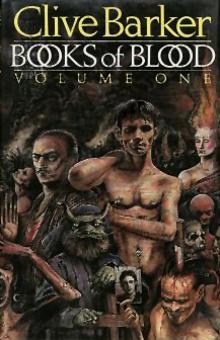 Books Of Blood Vol 1
Books Of Blood Vol 1 Age of Desire
Age of Desire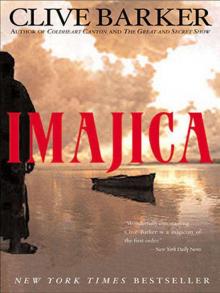 Imajica: Annotated Edition
Imajica: Annotated Edition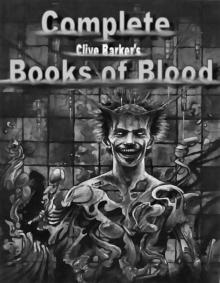 Complete Books of Blood
Complete Books of Blood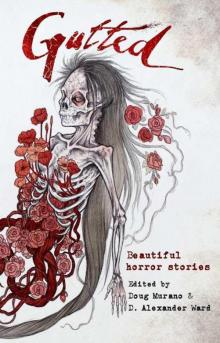 Gutted: Beautiful Horror Stories
Gutted: Beautiful Horror Stories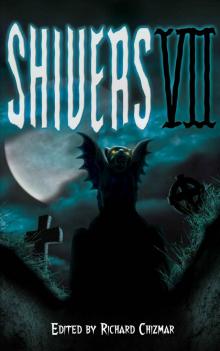 Shivers 7
Shivers 7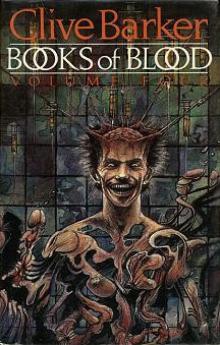 Books Of Blood Vol 4
Books Of Blood Vol 4